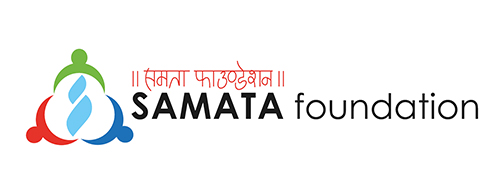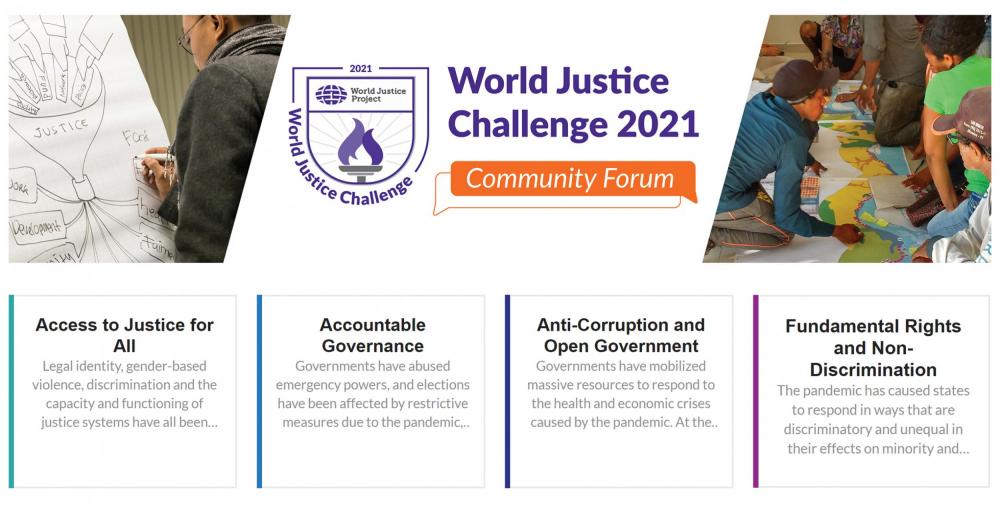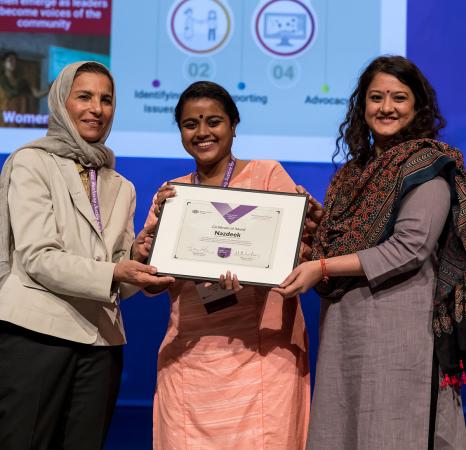Project Pitch and Q&A
Watch Samata Foundation's World Justice Challenge project pitch and join WJP's World Justice Challenge 2021 Community Forum to ask questions to project representatives, explore additional resources, meet new colleagues, and more. Join the discussion and help us build stronger rule of law values, institutions, and communities around the world.
Ask your question at the Community Forum
Project Summary
Jaat ko Prashna, a television program, addressed deeply rooted caste-based discrimination and violence in Nepal. It empowered the Dalit community to speak out against discrimination faced by them. Importantly, it effected polity-level changes: after participating in the program, the Chief Minister of Province 2 convened the first meeting of the Cast-Based Discrimination and Untouchability Monitoring Unit. Similarly, Mr. Sher Bahadur Deuba, the ex-prime minister and opposition party leader, made public commitments toward totally inclusive and proportional representation as mandated by the Constitution of Nepal. Jaat ko Prashna transformed the question of caste into a topic for household conversation in Nepal.
Problem Statement
Structural discrimination against Dalits, prevalent in the Nepali society, surfaced explicitly during COVID-19. In just five months of COVID-19 lockdown, 23 Dalits were murdered, some lynched by mobs, some through sexual violence, etc. Dalits also experienced discrimination and prejudice during the distribution of COVID-19 relief materials and medical supplies. COVID-19 measures such as isolation and 'social distancing' reinforced age-old discriminatory practices against Dalits by legitimizing the practice of untouchability and social exclusion, even though these practices are explicitly banned by the Constitution of Nepal and attendant laws.
Accessible justice was not a priority for the government during the pandemic and lockdown. Since the lockdowns affected low-income families disproportionately, the Dalits of Nepal were negatively affected the most. Dalits, most of who live under the line of poverty, had their livelihoods further threatened. Caste and economic realities are inextricably tied. Dalits, therefore, have the least access to emergency healthcare, nutrition, medical insurance, and other financing. The government’s failure to contain the pandemic even after economically detrimental lockdowns further pushed Dalit lives into jeopardy.
Jaat ko Prashna broadcast at a time when news stories about Dalit youths being lynched, Dalit laborers starving to death, and young Dalit women being raped and murdered dominated national media, highlighting the shortcomings of existing laws to address systemic caste-based violence. It put extra pressure on government agencies to enforce laws like Act on Caste-Based Discrimination and Untouchability. Through interviews with prominent figures in Nepali society and politics, Jaat Ko Prashna facilitated the Nepali society's reckoning with the question of caste and a societal discourse on the violation of rule of law against Dalits.
Project Description
Jaat ko Prashna addressed the rule of law problem by putting in the hot-seat individuals responsible for enforcing the laws: The Inspector General of Police, Minister of Law, two ex-prime ministers, the Attorney General of Nepal, Provincial chief ministers, Leader of the Opposition Party, and Dalit and non-Dalit public intellectuals were invited as guests to discuss the reality of caste issues in Nepal. Consequently, public commitments were made by policymakers and enforcers at the highest levels. Formal and informal advocacy activities happened on television, before a national audience. The Chairperson of the Parliamentary Committee for Law, Justice and Human Rights convened a meeting of the committee and instructed the Nepal Police to form a specialist Dalit Cell.
Across 12 television episodes, Jaat ko Prashna inculcated at the household level a culture of dialogue on the realities of caste discrimination in Nepal. It questioned both the history and the contemporary reality of caste and Dalit lives across all regions of Nepal. Also, it was able to put public pressure on the national-level public figures and duty bearers on the human rights of Dalits and the rule of law.
The project had impacts at the policy and the community levels. At the policy level, after speaking at the program, the Chief Minister of Sudurpashchim Province formed a committee to draft a Dalit Empowerment Bill. This was subsequently replicated in other provinces.
At the community level, the quantitative impact was measured by huge audience response and engagement. One of the program episodes had 423,000 views on YouTube. This particular episode featured two Nepali actors in an inter-caste marriage. Many Dalit individuals have started speaking against discrimination and stories of resistance in media and social media. Furthermore, many Dalit murder cases for which justice had been delayed, saw swifter action being taken to resolve them.
Project Impact and Potential for Scaling, Replication, and Sustainability
Jaat Ko Prashna laid the foundations for societal conversations around caste, which can be further transformed into a national dialogue. It played the watchdog to ensure justice delivery to victims of caste-based violence, which had spiked during the COVID-19 crisis. It sensitized and created a sense of accountability among justice delivery institutions such as the police, judicial bodies, and local governments. It also sowed a sense of rights in the Dalit community.
This project could be scaled up further with the following potential areas:
- Following-up on issues and policy changes promised during the previous season of the show in the next season of Jaat ko Prashna.
- Using the public discourse created by it to promote primary policy-level advocacy issues.
- Creating policy-specific episodes. For example, after the recent killings of Dalits, the Law, Justice, and Human Rights Committee of the House of Representatives has directed Nepal Police to form Dalit cells at its police posts. The show could follow up on the issue in future episodes.
- The practice of caste-based discrimination is present across other South Asian countries like India, Sri Lanka, Pakistan, Bangladesh, etc. Therefore, the project has the potential to inspire Dalit communities across the entire South Asia Region, and of impacting regional laws and policies.
- The approach could also be replicated to advocate on other issues of marginalization.
It is estimated that caste-based discrimination affects the lives of approximately 260 million people globally. The double discrimination faced by Dalits during crises like COVID-19 has been witnessed all over South Asia. During any public crisis, certain groups, caste, or gender are labeled, stereotyped, discriminated against or pushed into exclusion. A program like Jaat ko Prashna could create awareness among people regarding the social stigma and discriminatory practices against people of specific ethnic backgrounds. An effective and timely television show, combined with advocacy campaigns, can bring duty bearers, justice delivery institutions, and victims together to produce a multiplier effect. Such a show could serve as the template for addressing other areas of discrimination and exclusion, such as gender-based violence, racial discrimination, and LGBTQ issues within Nepal and other South Asian Countries.
The commitments made and actions taken by the political leaders invited to the program, and the policy gains that have resulted from their participation, accompanied by monitoring campaigns, indicate the sustainability potential of the project.
Featured Resources
- The Kathmandu Post: "An Ideology of Exclusion" (Oct 2020)
- The Kathmandu Post: "Why We Need to Talk About Caste" (Aug 2020)
- The Kathmandu Post: "'Jaat Ko Prashna', A Talk Show About Caste Discrimination Airs on Kantipur TV Tomorrow" (Jul 2020)
- Episodes of Jaat Ko Prashna
Key Project Links
Social Media: Facebook, Twitter, YouTube, Instagram, LinkedIn
Website: samatafoundation.org
Submit Your Questions and Get Ready to Pick a Winner!
Representatives of World Justice Challenge 2021 finalist projects are on hand to answer your questions. Join our online Community Forum to engage with finalists, share resources, and network with other members of the rule of law community. Submit your questions now and get ready to vote for your favorite project—voting opens in mid-April!
Join the Conversation

